Analysis of Entrepreneurial Ventures and Economic Impact in the UK
VerifiedAdded on 2023/01/11
|14
|2921
|88
Report
AI Summary
This report provides a comprehensive overview of entrepreneurship and small business management. It begins by defining entrepreneurship and exploring various types of entrepreneurial ventures, including small businesses, large companies, scalable start-ups, and social enterprises, and discusses their typologies. The report then examines the similarities and differences between these organizational forms. A significant portion of the report is dedicated to assessing the economic impact of micro and small businesses in the UK, utilizing relevant data and statistics to illustrate their contributions. The importance of small businesses and start-ups in fostering social economic growth is also highlighted. The report concludes by outlining the characteristics and skills of successful British entrepreneurs, such as Simon Cowell and Duncan Bannatyne, providing insights into their approaches to business management and innovation.
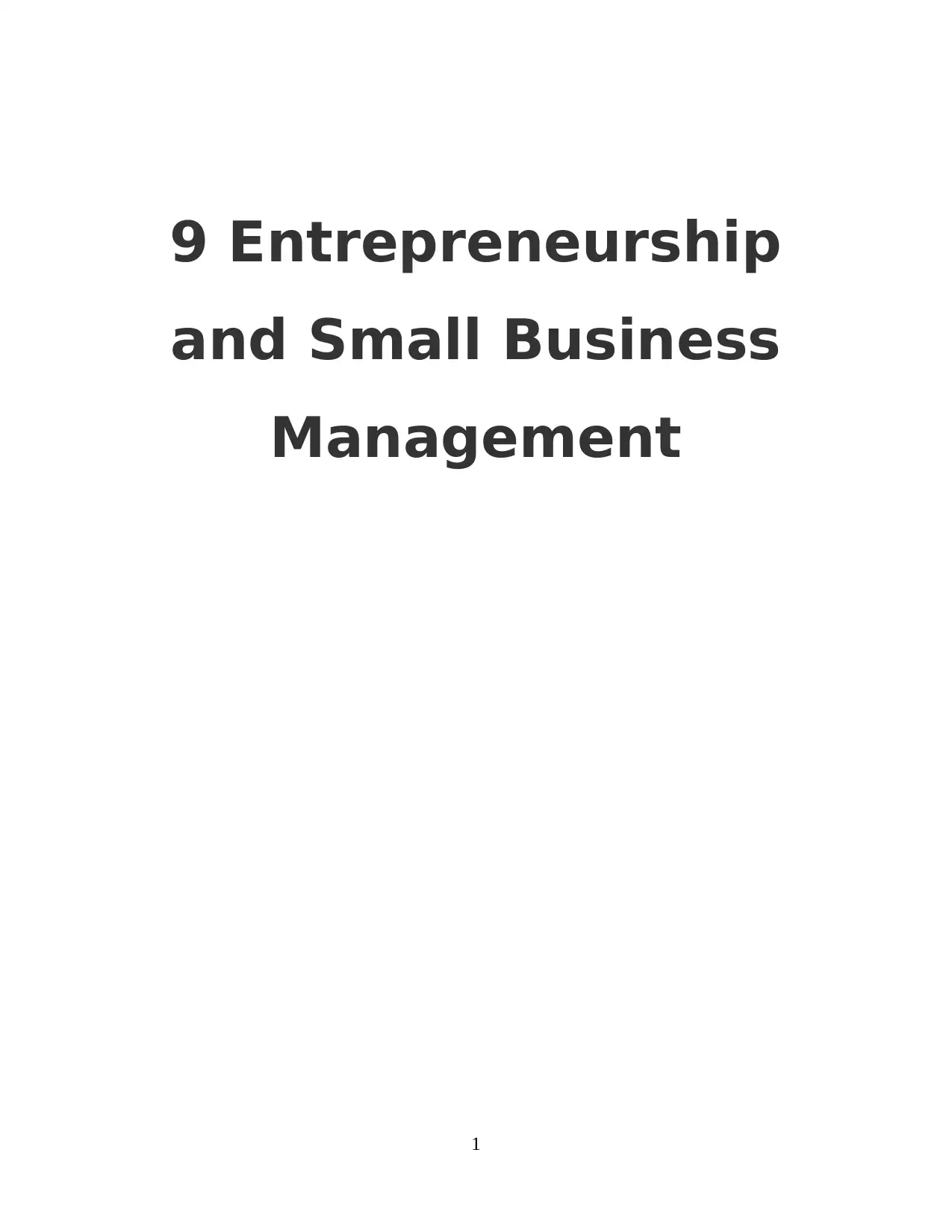
9 Entrepreneurship
and Small Business
Management
1
and Small Business
Management
1
Paraphrase This Document
Need a fresh take? Get an instant paraphrase of this document with our AI Paraphraser
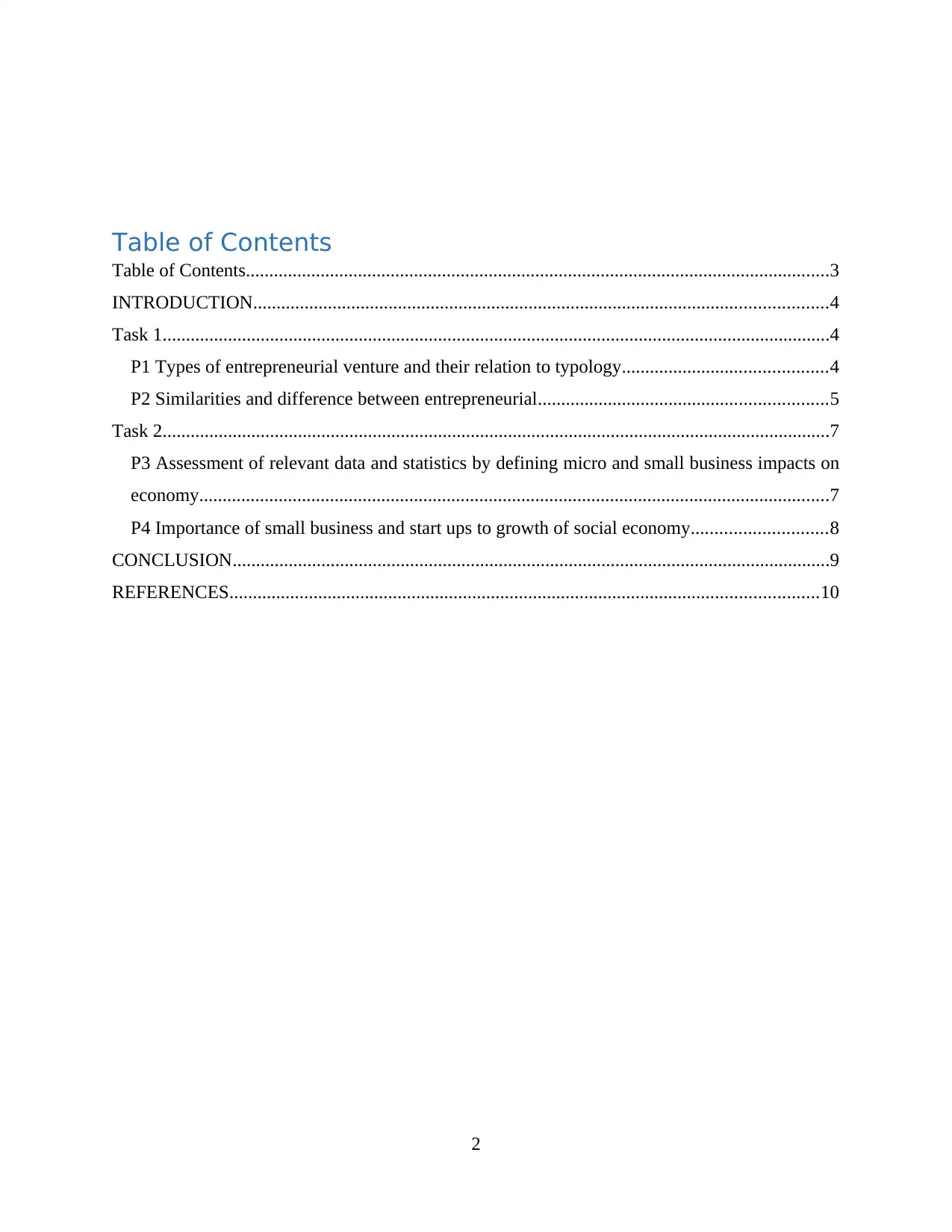
Table of Contents
Table of Contents.............................................................................................................................3
INTRODUCTION...........................................................................................................................4
Task 1...............................................................................................................................................4
P1 Types of entrepreneurial venture and their relation to typology............................................4
P2 Similarities and difference between entrepreneurial..............................................................5
Task 2...............................................................................................................................................7
P3 Assessment of relevant data and statistics by defining micro and small business impacts on
economy.......................................................................................................................................7
P4 Importance of small business and start ups to growth of social economy.............................8
CONCLUSION................................................................................................................................9
REFERENCES..............................................................................................................................10
2
Table of Contents.............................................................................................................................3
INTRODUCTION...........................................................................................................................4
Task 1...............................................................................................................................................4
P1 Types of entrepreneurial venture and their relation to typology............................................4
P2 Similarities and difference between entrepreneurial..............................................................5
Task 2...............................................................................................................................................7
P3 Assessment of relevant data and statistics by defining micro and small business impacts on
economy.......................................................................................................................................7
P4 Importance of small business and start ups to growth of social economy.............................8
CONCLUSION................................................................................................................................9
REFERENCES..............................................................................................................................10
2
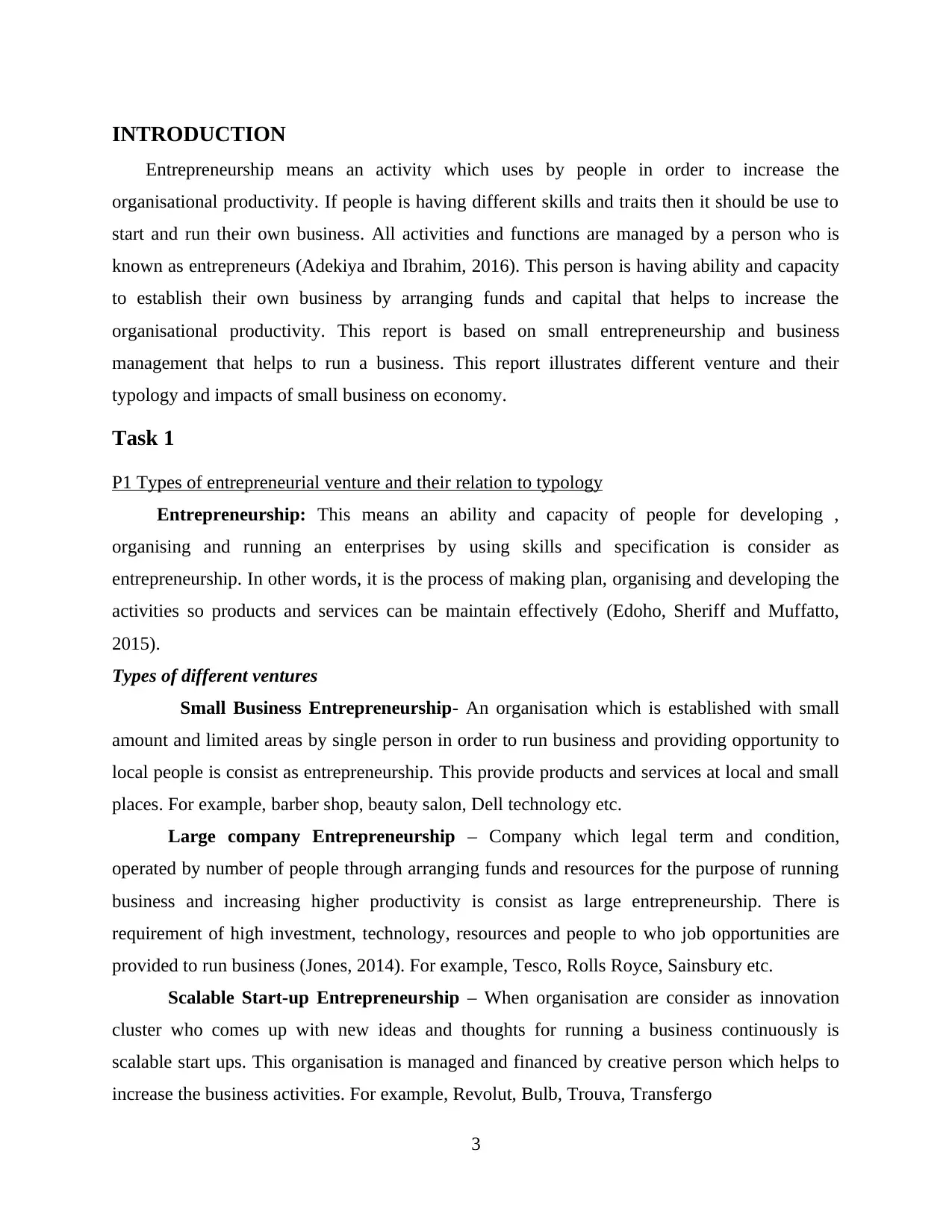
INTRODUCTION
Entrepreneurship means an activity which uses by people in order to increase the
organisational productivity. If people is having different skills and traits then it should be use to
start and run their own business. All activities and functions are managed by a person who is
known as entrepreneurs (Adekiya and Ibrahim, 2016). This person is having ability and capacity
to establish their own business by arranging funds and capital that helps to increase the
organisational productivity. This report is based on small entrepreneurship and business
management that helps to run a business. This report illustrates different venture and their
typology and impacts of small business on economy.
Task 1
P1 Types of entrepreneurial venture and their relation to typology
Entrepreneurship: This means an ability and capacity of people for developing ,
organising and running an enterprises by using skills and specification is consider as
entrepreneurship. In other words, it is the process of making plan, organising and developing the
activities so products and services can be maintain effectively (Edoho, Sheriff and Muffatto,
2015).
Types of different ventures
Small Business Entrepreneurship- An organisation which is established with small
amount and limited areas by single person in order to run business and providing opportunity to
local people is consist as entrepreneurship. This provide products and services at local and small
places. For example, barber shop, beauty salon, Dell technology etc.
Large company Entrepreneurship – Company which legal term and condition,
operated by number of people through arranging funds and resources for the purpose of running
business and increasing higher productivity is consist as large entrepreneurship. There is
requirement of high investment, technology, resources and people to who job opportunities are
provided to run business (Jones, 2014). For example, Tesco, Rolls Royce, Sainsbury etc.
Scalable Start-up Entrepreneurship – When organisation are consider as innovation
cluster who comes up with new ideas and thoughts for running a business continuously is
scalable start ups. This organisation is managed and financed by creative person which helps to
increase the business activities. For example, Revolut, Bulb, Trouva, Transfergo
3
Entrepreneurship means an activity which uses by people in order to increase the
organisational productivity. If people is having different skills and traits then it should be use to
start and run their own business. All activities and functions are managed by a person who is
known as entrepreneurs (Adekiya and Ibrahim, 2016). This person is having ability and capacity
to establish their own business by arranging funds and capital that helps to increase the
organisational productivity. This report is based on small entrepreneurship and business
management that helps to run a business. This report illustrates different venture and their
typology and impacts of small business on economy.
Task 1
P1 Types of entrepreneurial venture and their relation to typology
Entrepreneurship: This means an ability and capacity of people for developing ,
organising and running an enterprises by using skills and specification is consider as
entrepreneurship. In other words, it is the process of making plan, organising and developing the
activities so products and services can be maintain effectively (Edoho, Sheriff and Muffatto,
2015).
Types of different ventures
Small Business Entrepreneurship- An organisation which is established with small
amount and limited areas by single person in order to run business and providing opportunity to
local people is consist as entrepreneurship. This provide products and services at local and small
places. For example, barber shop, beauty salon, Dell technology etc.
Large company Entrepreneurship – Company which legal term and condition,
operated by number of people through arranging funds and resources for the purpose of running
business and increasing higher productivity is consist as large entrepreneurship. There is
requirement of high investment, technology, resources and people to who job opportunities are
provided to run business (Jones, 2014). For example, Tesco, Rolls Royce, Sainsbury etc.
Scalable Start-up Entrepreneurship – When organisation are consider as innovation
cluster who comes up with new ideas and thoughts for running a business continuously is
scalable start ups. This organisation is managed and financed by creative person which helps to
increase the business activities. For example, Revolut, Bulb, Trouva, Transfergo
3
⊘ This is a preview!⊘
Do you want full access?
Subscribe today to unlock all pages.

Trusted by 1+ million students worldwide
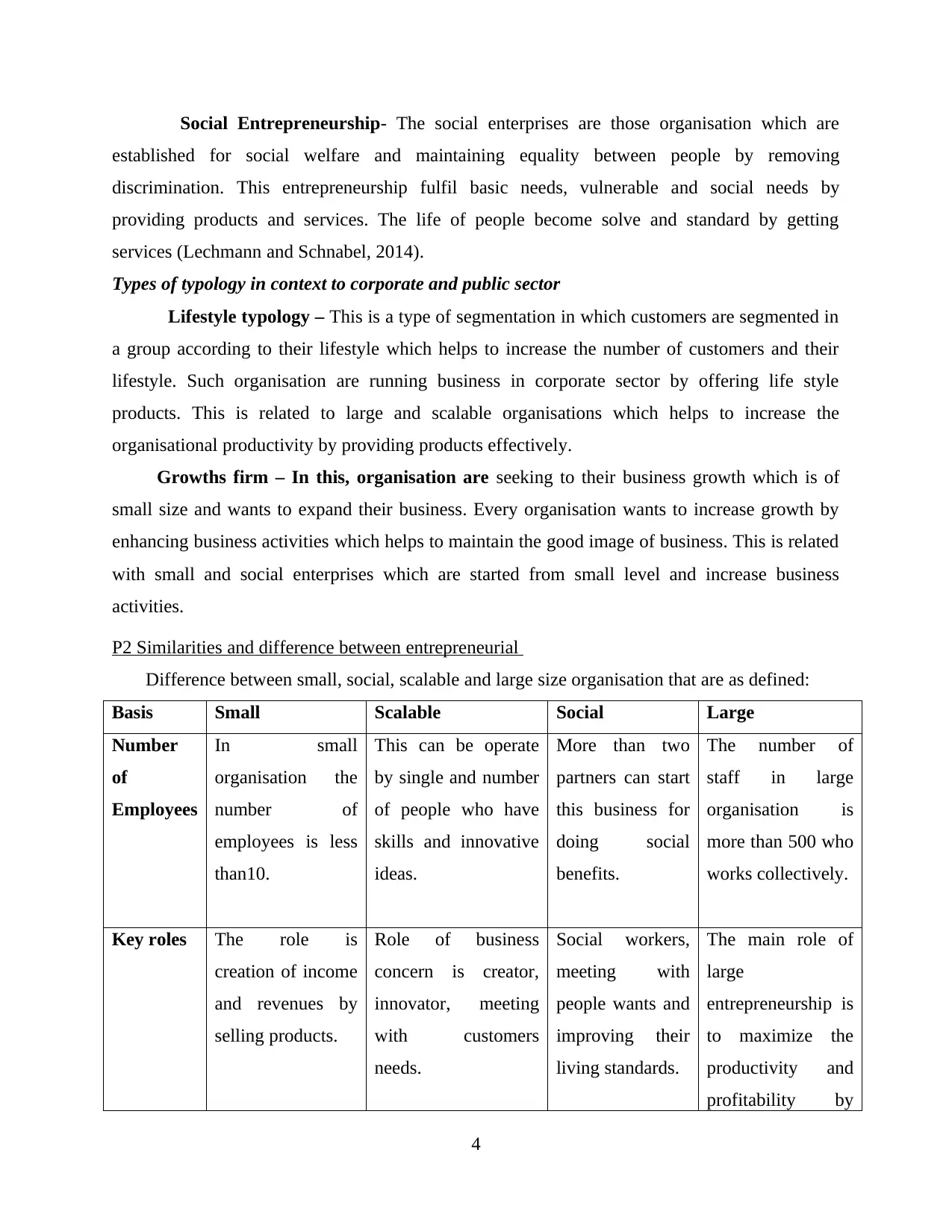
Social Entrepreneurship- The social enterprises are those organisation which are
established for social welfare and maintaining equality between people by removing
discrimination. This entrepreneurship fulfil basic needs, vulnerable and social needs by
providing products and services. The life of people become solve and standard by getting
services (Lechmann and Schnabel, 2014).
Types of typology in context to corporate and public sector
Lifestyle typology – This is a type of segmentation in which customers are segmented in
a group according to their lifestyle which helps to increase the number of customers and their
lifestyle. Such organisation are running business in corporate sector by offering life style
products. This is related to large and scalable organisations which helps to increase the
organisational productivity by providing products effectively.
Growths firm – In this, organisation are seeking to their business growth which is of
small size and wants to expand their business. Every organisation wants to increase growth by
enhancing business activities which helps to maintain the good image of business. This is related
with small and social enterprises which are started from small level and increase business
activities.
P2 Similarities and difference between entrepreneurial
Difference between small, social, scalable and large size organisation that are as defined:
Basis Small Scalable Social Large
Number
of
Employees
In small
organisation the
number of
employees is less
than10.
This can be operate
by single and number
of people who have
skills and innovative
ideas.
More than two
partners can start
this business for
doing social
benefits.
The number of
staff in large
organisation is
more than 500 who
works collectively.
Key roles The role is
creation of income
and revenues by
selling products.
Role of business
concern is creator,
innovator, meeting
with customers
needs.
Social workers,
meeting with
people wants and
improving their
living standards.
The main role of
large
entrepreneurship is
to maximize the
productivity and
profitability by
4
established for social welfare and maintaining equality between people by removing
discrimination. This entrepreneurship fulfil basic needs, vulnerable and social needs by
providing products and services. The life of people become solve and standard by getting
services (Lechmann and Schnabel, 2014).
Types of typology in context to corporate and public sector
Lifestyle typology – This is a type of segmentation in which customers are segmented in
a group according to their lifestyle which helps to increase the number of customers and their
lifestyle. Such organisation are running business in corporate sector by offering life style
products. This is related to large and scalable organisations which helps to increase the
organisational productivity by providing products effectively.
Growths firm – In this, organisation are seeking to their business growth which is of
small size and wants to expand their business. Every organisation wants to increase growth by
enhancing business activities which helps to maintain the good image of business. This is related
with small and social enterprises which are started from small level and increase business
activities.
P2 Similarities and difference between entrepreneurial
Difference between small, social, scalable and large size organisation that are as defined:
Basis Small Scalable Social Large
Number
of
Employees
In small
organisation the
number of
employees is less
than10.
This can be operate
by single and number
of people who have
skills and innovative
ideas.
More than two
partners can start
this business for
doing social
benefits.
The number of
staff in large
organisation is
more than 500 who
works collectively.
Key roles The role is
creation of income
and revenues by
selling products.
Role of business
concern is creator,
innovator, meeting
with customers
needs.
Social workers,
meeting with
people wants and
improving their
living standards.
The main role of
large
entrepreneurship is
to maximize the
productivity and
profitability by
4
Paraphrase This Document
Need a fresh take? Get an instant paraphrase of this document with our AI Paraphraser
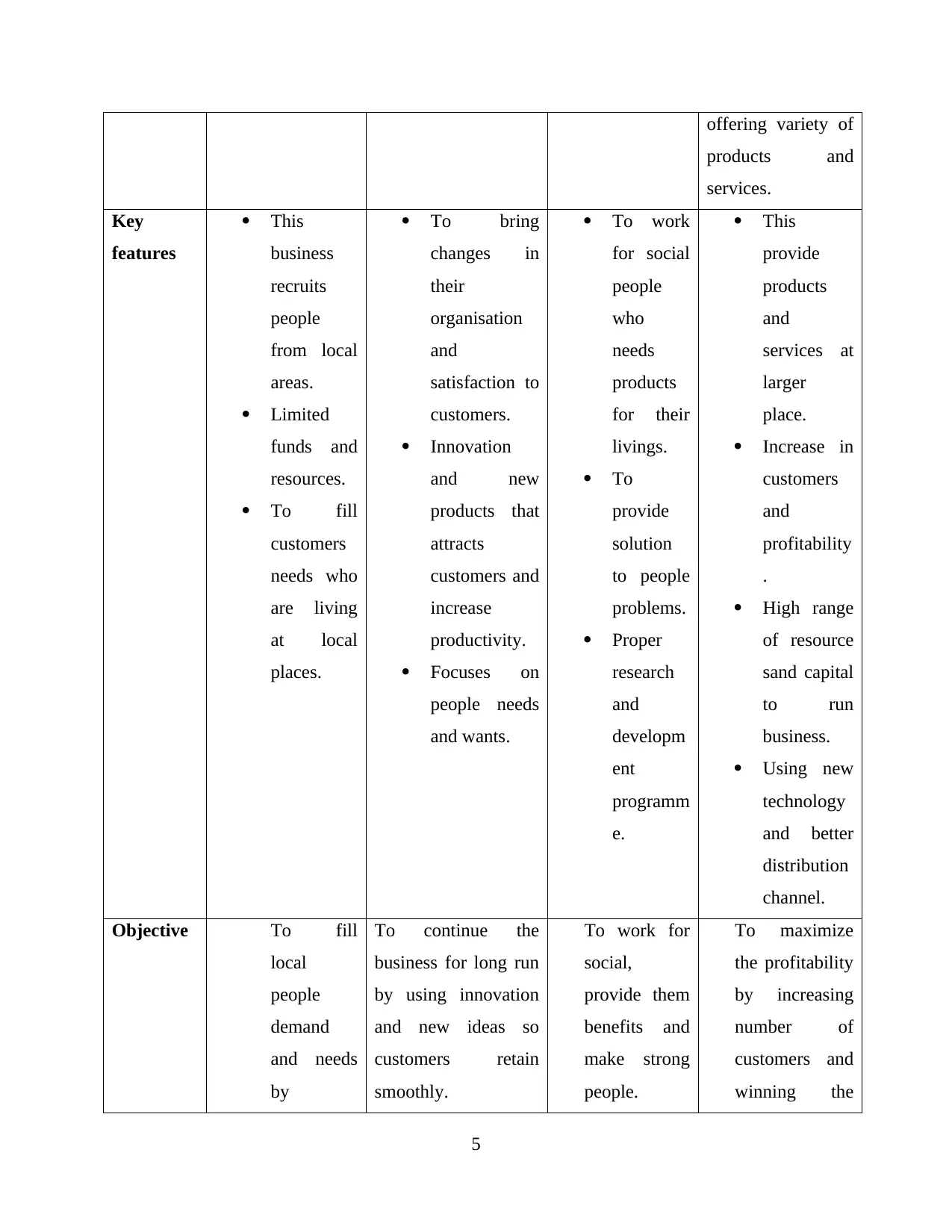
offering variety of
products and
services.
Key
features
This
business
recruits
people
from local
areas.
Limited
funds and
resources.
To fill
customers
needs who
are living
at local
places.
To bring
changes in
their
organisation
and
satisfaction to
customers.
Innovation
and new
products that
attracts
customers and
increase
productivity.
Focuses on
people needs
and wants.
To work
for social
people
who
needs
products
for their
livings.
To
provide
solution
to people
problems.
Proper
research
and
developm
ent
programm
e.
This
provide
products
and
services at
larger
place.
Increase in
customers
and
profitability
.
High range
of resource
sand capital
to run
business.
Using new
technology
and better
distribution
channel.
Objective To fill
local
people
demand
and needs
by
To continue the
business for long run
by using innovation
and new ideas so
customers retain
smoothly.
To work for
social,
provide them
benefits and
make strong
people.
To maximize
the profitability
by increasing
number of
customers and
winning the
5
products and
services.
Key
features
This
business
recruits
people
from local
areas.
Limited
funds and
resources.
To fill
customers
needs who
are living
at local
places.
To bring
changes in
their
organisation
and
satisfaction to
customers.
Innovation
and new
products that
attracts
customers and
increase
productivity.
Focuses on
people needs
and wants.
To work
for social
people
who
needs
products
for their
livings.
To
provide
solution
to people
problems.
Proper
research
and
developm
ent
programm
e.
This
provide
products
and
services at
larger
place.
Increase in
customers
and
profitability
.
High range
of resource
sand capital
to run
business.
Using new
technology
and better
distribution
channel.
Objective To fill
local
people
demand
and needs
by
To continue the
business for long run
by using innovation
and new ideas so
customers retain
smoothly.
To work for
social,
provide them
benefits and
make strong
people.
To maximize
the profitability
by increasing
number of
customers and
winning the
5
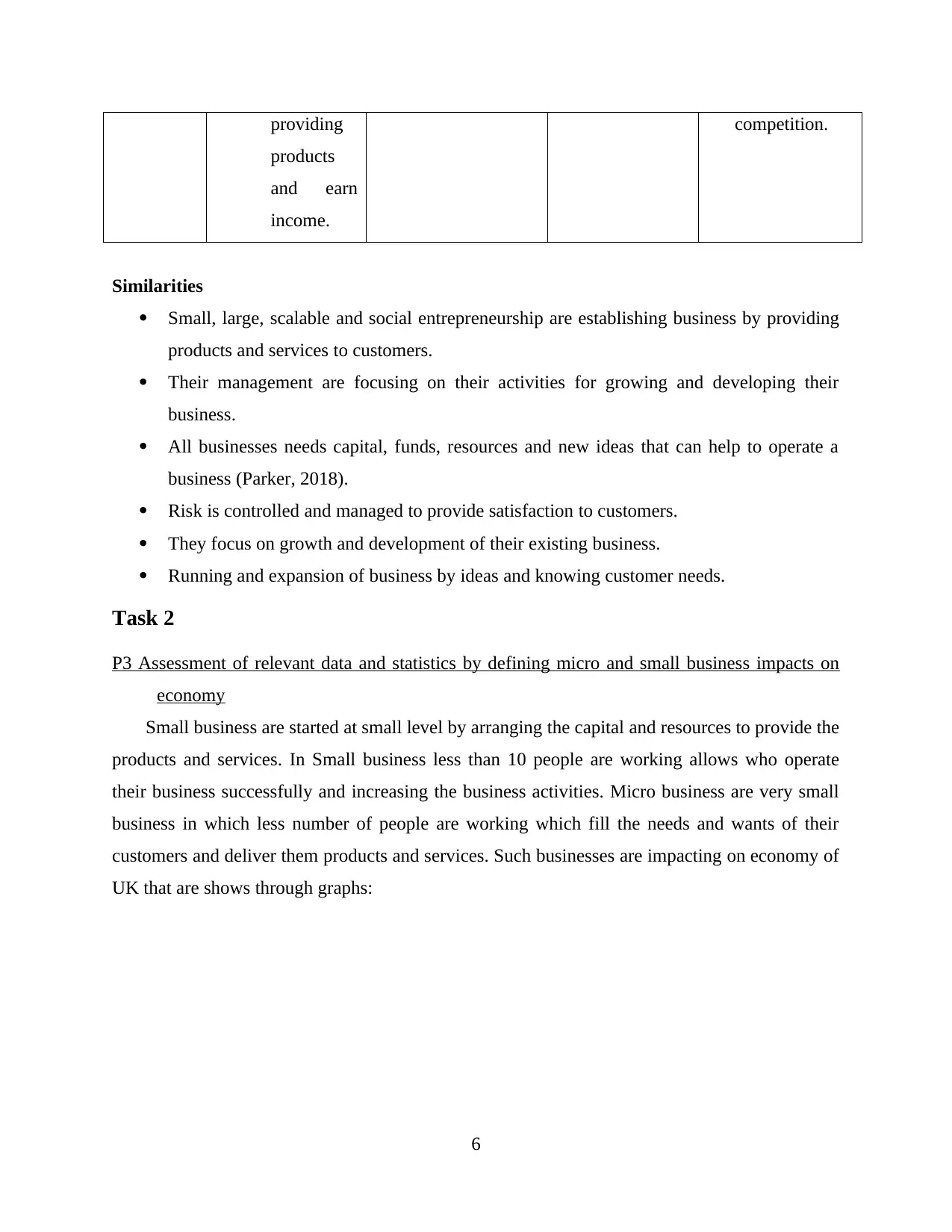
providing
products
and earn
income.
competition.
Similarities
Small, large, scalable and social entrepreneurship are establishing business by providing
products and services to customers.
Their management are focusing on their activities for growing and developing their
business.
All businesses needs capital, funds, resources and new ideas that can help to operate a
business (Parker, 2018).
Risk is controlled and managed to provide satisfaction to customers.
They focus on growth and development of their existing business.
Running and expansion of business by ideas and knowing customer needs.
Task 2
P3 Assessment of relevant data and statistics by defining micro and small business impacts on
economy
Small business are started at small level by arranging the capital and resources to provide the
products and services. In Small business less than 10 people are working allows who operate
their business successfully and increasing the business activities. Micro business are very small
business in which less number of people are working which fill the needs and wants of their
customers and deliver them products and services. Such businesses are impacting on economy of
UK that are shows through graphs:
6
products
and earn
income.
competition.
Similarities
Small, large, scalable and social entrepreneurship are establishing business by providing
products and services to customers.
Their management are focusing on their activities for growing and developing their
business.
All businesses needs capital, funds, resources and new ideas that can help to operate a
business (Parker, 2018).
Risk is controlled and managed to provide satisfaction to customers.
They focus on growth and development of their existing business.
Running and expansion of business by ideas and knowing customer needs.
Task 2
P3 Assessment of relevant data and statistics by defining micro and small business impacts on
economy
Small business are started at small level by arranging the capital and resources to provide the
products and services. In Small business less than 10 people are working allows who operate
their business successfully and increasing the business activities. Micro business are very small
business in which less number of people are working which fill the needs and wants of their
customers and deliver them products and services. Such businesses are impacting on economy of
UK that are shows through graphs:
6
⊘ This is a preview!⊘
Do you want full access?
Subscribe today to unlock all pages.

Trusted by 1+ million students worldwide
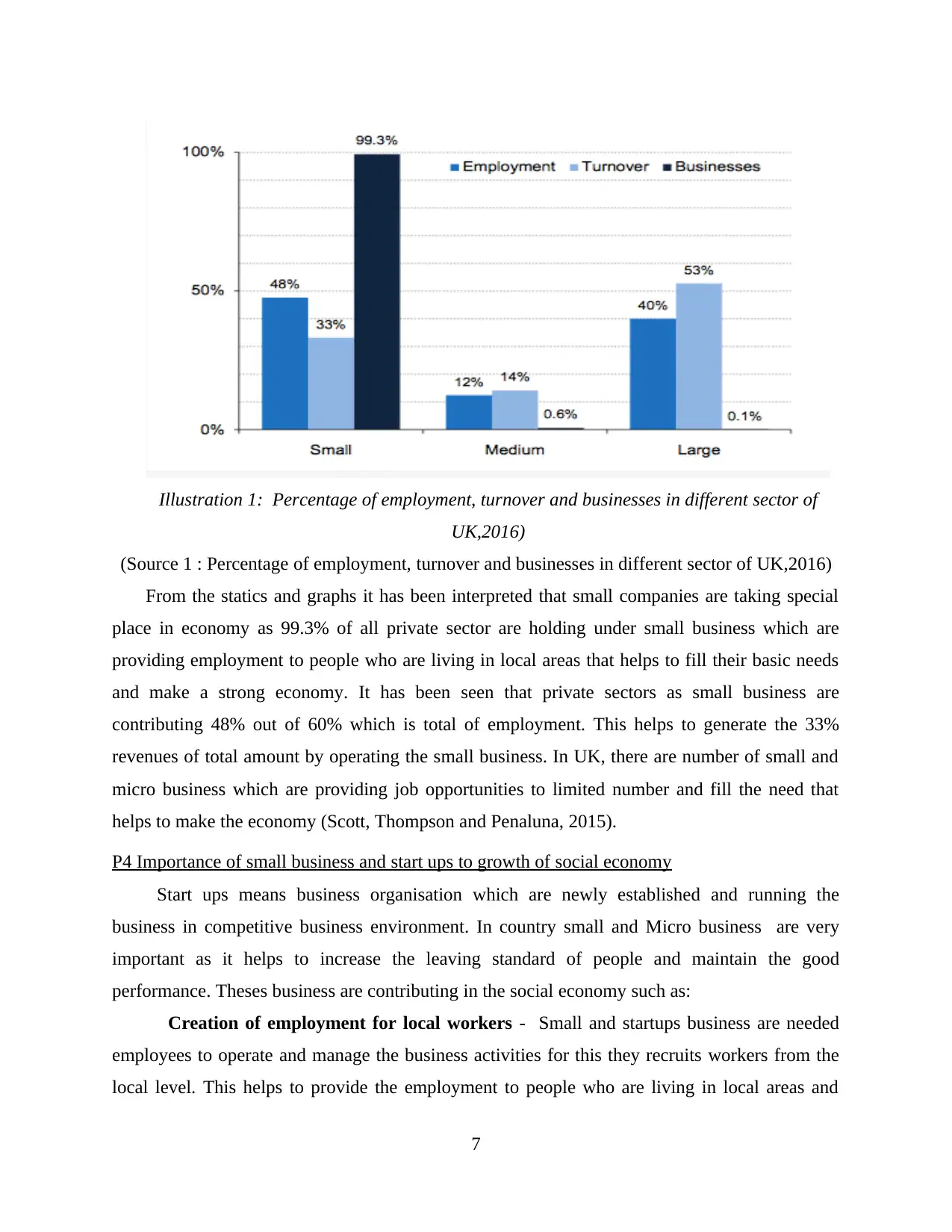
Illustration 1: Percentage of employment, turnover and businesses in different sector of
UK,2016)
(Source 1 : Percentage of employment, turnover and businesses in different sector of UK,2016)
From the statics and graphs it has been interpreted that small companies are taking special
place in economy as 99.3% of all private sector are holding under small business which are
providing employment to people who are living in local areas that helps to fill their basic needs
and make a strong economy. It has been seen that private sectors as small business are
contributing 48% out of 60% which is total of employment. This helps to generate the 33%
revenues of total amount by operating the small business. In UK, there are number of small and
micro business which are providing job opportunities to limited number and fill the need that
helps to make the economy (Scott, Thompson and Penaluna, 2015).
P4 Importance of small business and start ups to growth of social economy
Start ups means business organisation which are newly established and running the
business in competitive business environment. In country small and Micro business are very
important as it helps to increase the leaving standard of people and maintain the good
performance. Theses business are contributing in the social economy such as:
Creation of employment for local workers - Small and startups business are needed
employees to operate and manage the business activities for this they recruits workers from the
local level. This helps to provide the employment to people who are living in local areas and
7
UK,2016)
(Source 1 : Percentage of employment, turnover and businesses in different sector of UK,2016)
From the statics and graphs it has been interpreted that small companies are taking special
place in economy as 99.3% of all private sector are holding under small business which are
providing employment to people who are living in local areas that helps to fill their basic needs
and make a strong economy. It has been seen that private sectors as small business are
contributing 48% out of 60% which is total of employment. This helps to generate the 33%
revenues of total amount by operating the small business. In UK, there are number of small and
micro business which are providing job opportunities to limited number and fill the need that
helps to make the economy (Scott, Thompson and Penaluna, 2015).
P4 Importance of small business and start ups to growth of social economy
Start ups means business organisation which are newly established and running the
business in competitive business environment. In country small and Micro business are very
important as it helps to increase the leaving standard of people and maintain the good
performance. Theses business are contributing in the social economy such as:
Creation of employment for local workers - Small and startups business are needed
employees to operate and manage the business activities for this they recruits workers from the
local level. This helps to provide the employment to people who are living in local areas and
7
Paraphrase This Document
Need a fresh take? Get an instant paraphrase of this document with our AI Paraphraser
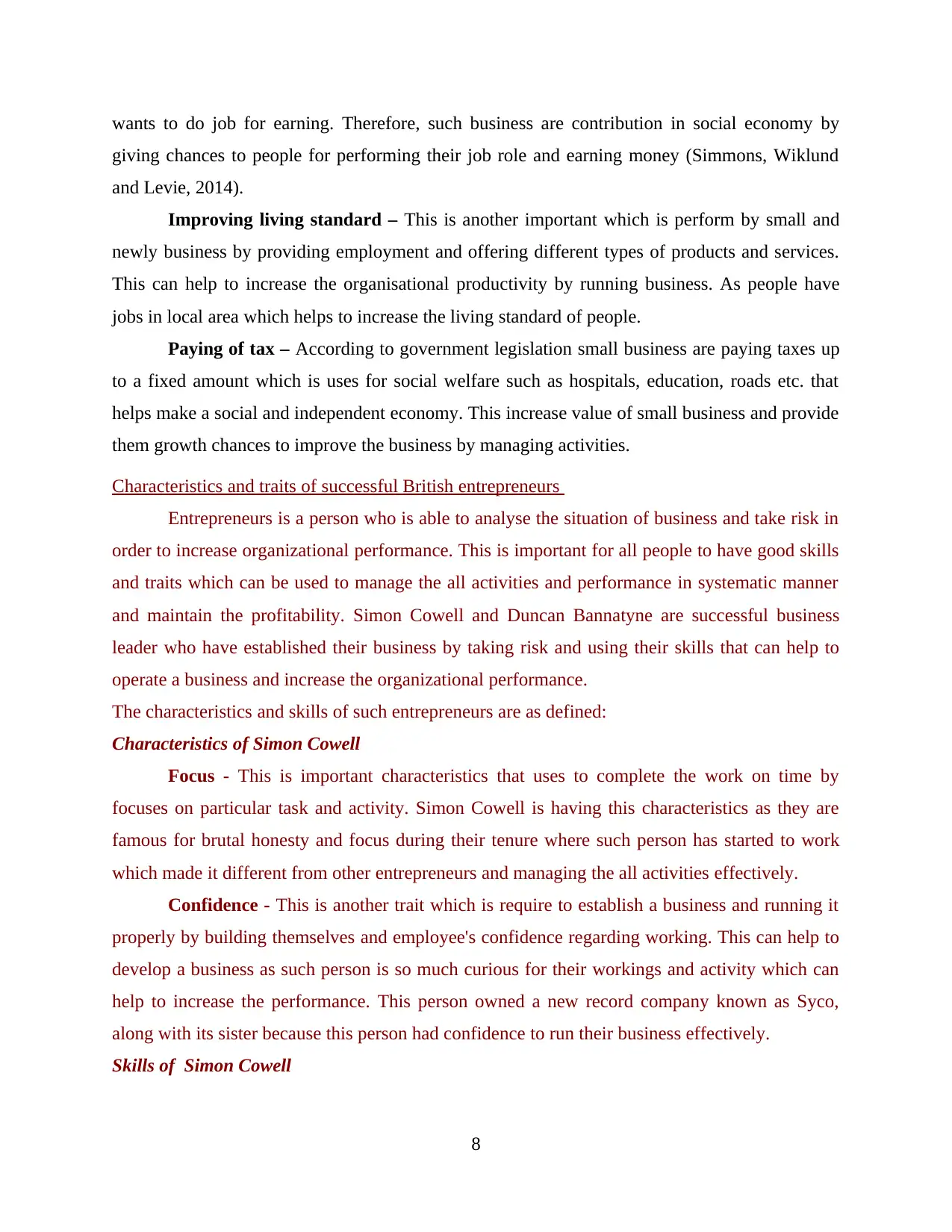
wants to do job for earning. Therefore, such business are contribution in social economy by
giving chances to people for performing their job role and earning money (Simmons, Wiklund
and Levie, 2014).
Improving living standard – This is another important which is perform by small and
newly business by providing employment and offering different types of products and services.
This can help to increase the organisational productivity by running business. As people have
jobs in local area which helps to increase the living standard of people.
Paying of tax – According to government legislation small business are paying taxes up
to a fixed amount which is uses for social welfare such as hospitals, education, roads etc. that
helps make a social and independent economy. This increase value of small business and provide
them growth chances to improve the business by managing activities.
Characteristics and traits of successful British entrepreneurs
Entrepreneurs is a person who is able to analyse the situation of business and take risk in
order to increase organizational performance. This is important for all people to have good skills
and traits which can be used to manage the all activities and performance in systematic manner
and maintain the profitability. Simon Cowell and Duncan Bannatyne are successful business
leader who have established their business by taking risk and using their skills that can help to
operate a business and increase the organizational performance.
The characteristics and skills of such entrepreneurs are as defined:
Characteristics of Simon Cowell
Focus - This is important characteristics that uses to complete the work on time by
focuses on particular task and activity. Simon Cowell is having this characteristics as they are
famous for brutal honesty and focus during their tenure where such person has started to work
which made it different from other entrepreneurs and managing the all activities effectively.
Confidence - This is another trait which is require to establish a business and running it
properly by building themselves and employee's confidence regarding working. This can help to
develop a business as such person is so much curious for their workings and activity which can
help to increase the performance. This person owned a new record company known as Syco,
along with its sister because this person had confidence to run their business effectively.
Skills of Simon Cowell
8
giving chances to people for performing their job role and earning money (Simmons, Wiklund
and Levie, 2014).
Improving living standard – This is another important which is perform by small and
newly business by providing employment and offering different types of products and services.
This can help to increase the organisational productivity by running business. As people have
jobs in local area which helps to increase the living standard of people.
Paying of tax – According to government legislation small business are paying taxes up
to a fixed amount which is uses for social welfare such as hospitals, education, roads etc. that
helps make a social and independent economy. This increase value of small business and provide
them growth chances to improve the business by managing activities.
Characteristics and traits of successful British entrepreneurs
Entrepreneurs is a person who is able to analyse the situation of business and take risk in
order to increase organizational performance. This is important for all people to have good skills
and traits which can be used to manage the all activities and performance in systematic manner
and maintain the profitability. Simon Cowell and Duncan Bannatyne are successful business
leader who have established their business by taking risk and using their skills that can help to
operate a business and increase the organizational performance.
The characteristics and skills of such entrepreneurs are as defined:
Characteristics of Simon Cowell
Focus - This is important characteristics that uses to complete the work on time by
focuses on particular task and activity. Simon Cowell is having this characteristics as they are
famous for brutal honesty and focus during their tenure where such person has started to work
which made it different from other entrepreneurs and managing the all activities effectively.
Confidence - This is another trait which is require to establish a business and running it
properly by building themselves and employee's confidence regarding working. This can help to
develop a business as such person is so much curious for their workings and activity which can
help to increase the performance. This person owned a new record company known as Syco,
along with its sister because this person had confidence to run their business effectively.
Skills of Simon Cowell
8
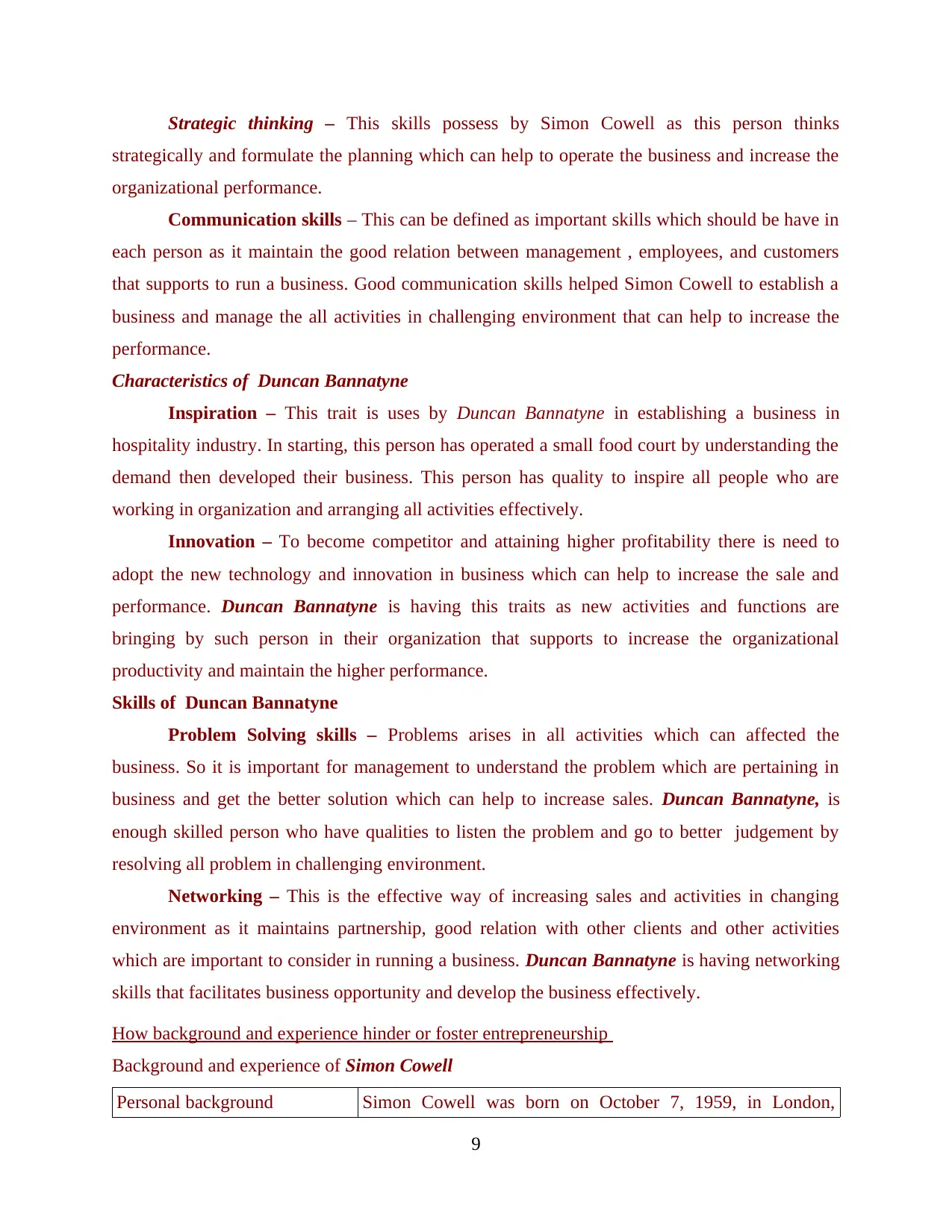
Strategic thinking – This skills possess by Simon Cowell as this person thinks
strategically and formulate the planning which can help to operate the business and increase the
organizational performance.
Communication skills – This can be defined as important skills which should be have in
each person as it maintain the good relation between management , employees, and customers
that supports to run a business. Good communication skills helped Simon Cowell to establish a
business and manage the all activities in challenging environment that can help to increase the
performance.
Characteristics of Duncan Bannatyne
Inspiration – This trait is uses by Duncan Bannatyne in establishing a business in
hospitality industry. In starting, this person has operated a small food court by understanding the
demand then developed their business. This person has quality to inspire all people who are
working in organization and arranging all activities effectively.
Innovation – To become competitor and attaining higher profitability there is need to
adopt the new technology and innovation in business which can help to increase the sale and
performance. Duncan Bannatyne is having this traits as new activities and functions are
bringing by such person in their organization that supports to increase the organizational
productivity and maintain the higher performance.
Skills of Duncan Bannatyne
Problem Solving skills – Problems arises in all activities which can affected the
business. So it is important for management to understand the problem which are pertaining in
business and get the better solution which can help to increase sales. Duncan Bannatyne, is
enough skilled person who have qualities to listen the problem and go to better judgement by
resolving all problem in challenging environment.
Networking – This is the effective way of increasing sales and activities in changing
environment as it maintains partnership, good relation with other clients and other activities
which are important to consider in running a business. Duncan Bannatyne is having networking
skills that facilitates business opportunity and develop the business effectively.
How background and experience hinder or foster entrepreneurship
Background and experience of Simon Cowell
Personal background Simon Cowell was born on October 7, 1959, in London,
9
strategically and formulate the planning which can help to operate the business and increase the
organizational performance.
Communication skills – This can be defined as important skills which should be have in
each person as it maintain the good relation between management , employees, and customers
that supports to run a business. Good communication skills helped Simon Cowell to establish a
business and manage the all activities in challenging environment that can help to increase the
performance.
Characteristics of Duncan Bannatyne
Inspiration – This trait is uses by Duncan Bannatyne in establishing a business in
hospitality industry. In starting, this person has operated a small food court by understanding the
demand then developed their business. This person has quality to inspire all people who are
working in organization and arranging all activities effectively.
Innovation – To become competitor and attaining higher profitability there is need to
adopt the new technology and innovation in business which can help to increase the sale and
performance. Duncan Bannatyne is having this traits as new activities and functions are
bringing by such person in their organization that supports to increase the organizational
productivity and maintain the higher performance.
Skills of Duncan Bannatyne
Problem Solving skills – Problems arises in all activities which can affected the
business. So it is important for management to understand the problem which are pertaining in
business and get the better solution which can help to increase sales. Duncan Bannatyne, is
enough skilled person who have qualities to listen the problem and go to better judgement by
resolving all problem in challenging environment.
Networking – This is the effective way of increasing sales and activities in changing
environment as it maintains partnership, good relation with other clients and other activities
which are important to consider in running a business. Duncan Bannatyne is having networking
skills that facilitates business opportunity and develop the business effectively.
How background and experience hinder or foster entrepreneurship
Background and experience of Simon Cowell
Personal background Simon Cowell was born on October 7, 1959, in London,
9
⊘ This is a preview!⊘
Do you want full access?
Subscribe today to unlock all pages.

Trusted by 1+ million students worldwide
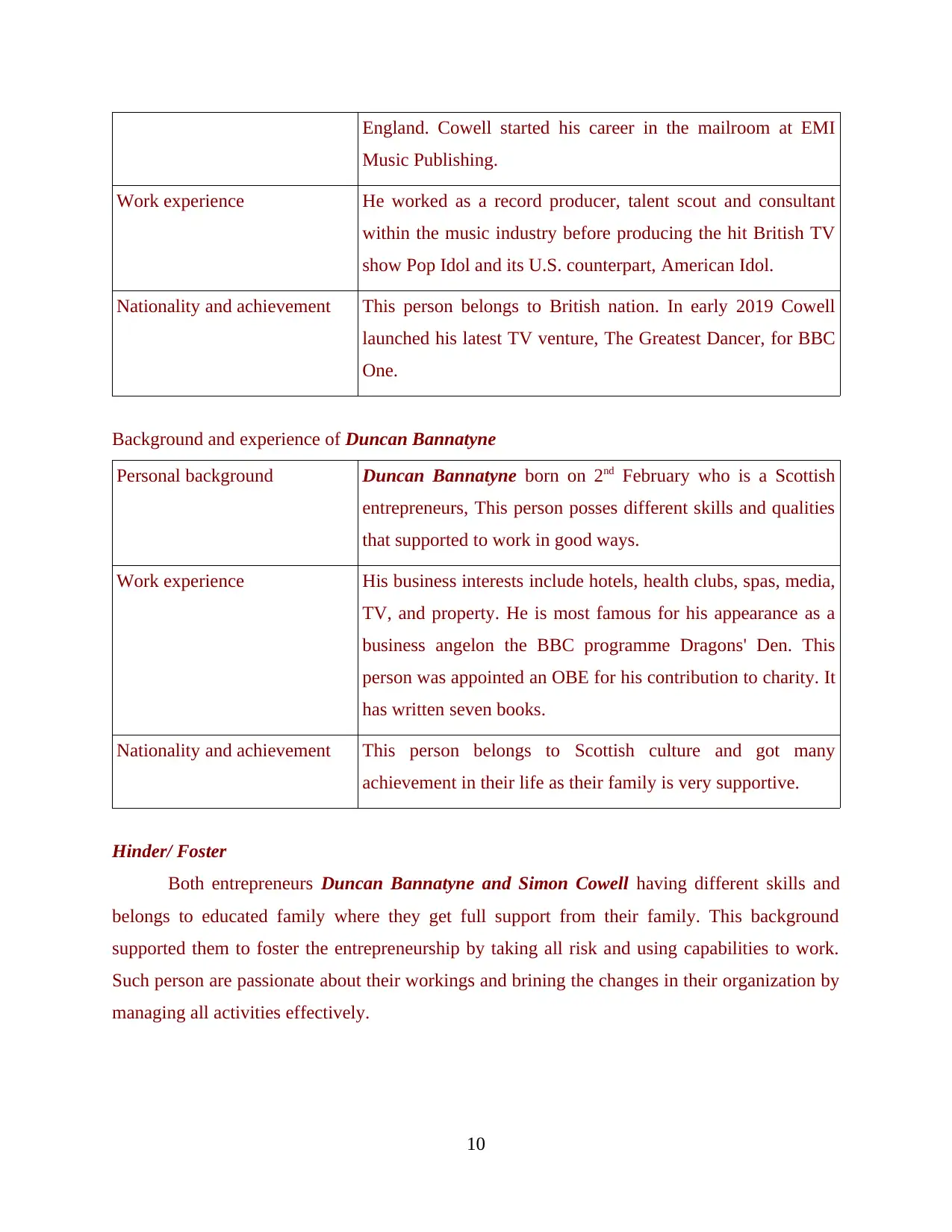
England. Cowell started his career in the mailroom at EMI
Music Publishing.
Work experience He worked as a record producer, talent scout and consultant
within the music industry before producing the hit British TV
show Pop Idol and its U.S. counterpart, American Idol.
Nationality and achievement This person belongs to British nation. In early 2019 Cowell
launched his latest TV venture, The Greatest Dancer, for BBC
One.
Background and experience of Duncan Bannatyne
Personal background Duncan Bannatyne born on 2nd February who is a Scottish
entrepreneurs, This person posses different skills and qualities
that supported to work in good ways.
Work experience His business interests include hotels, health clubs, spas, media,
TV, and property. He is most famous for his appearance as a
business angelon the BBC programme Dragons' Den. This
person was appointed an OBE for his contribution to charity. It
has written seven books.
Nationality and achievement This person belongs to Scottish culture and got many
achievement in their life as their family is very supportive.
Hinder/ Foster
Both entrepreneurs Duncan Bannatyne and Simon Cowell having different skills and
belongs to educated family where they get full support from their family. This background
supported them to foster the entrepreneurship by taking all risk and using capabilities to work.
Such person are passionate about their workings and brining the changes in their organization by
managing all activities effectively.
10
Music Publishing.
Work experience He worked as a record producer, talent scout and consultant
within the music industry before producing the hit British TV
show Pop Idol and its U.S. counterpart, American Idol.
Nationality and achievement This person belongs to British nation. In early 2019 Cowell
launched his latest TV venture, The Greatest Dancer, for BBC
One.
Background and experience of Duncan Bannatyne
Personal background Duncan Bannatyne born on 2nd February who is a Scottish
entrepreneurs, This person posses different skills and qualities
that supported to work in good ways.
Work experience His business interests include hotels, health clubs, spas, media,
TV, and property. He is most famous for his appearance as a
business angelon the BBC programme Dragons' Den. This
person was appointed an OBE for his contribution to charity. It
has written seven books.
Nationality and achievement This person belongs to Scottish culture and got many
achievement in their life as their family is very supportive.
Hinder/ Foster
Both entrepreneurs Duncan Bannatyne and Simon Cowell having different skills and
belongs to educated family where they get full support from their family. This background
supported them to foster the entrepreneurship by taking all risk and using capabilities to work.
Such person are passionate about their workings and brining the changes in their organization by
managing all activities effectively.
10
Paraphrase This Document
Need a fresh take? Get an instant paraphrase of this document with our AI Paraphraser
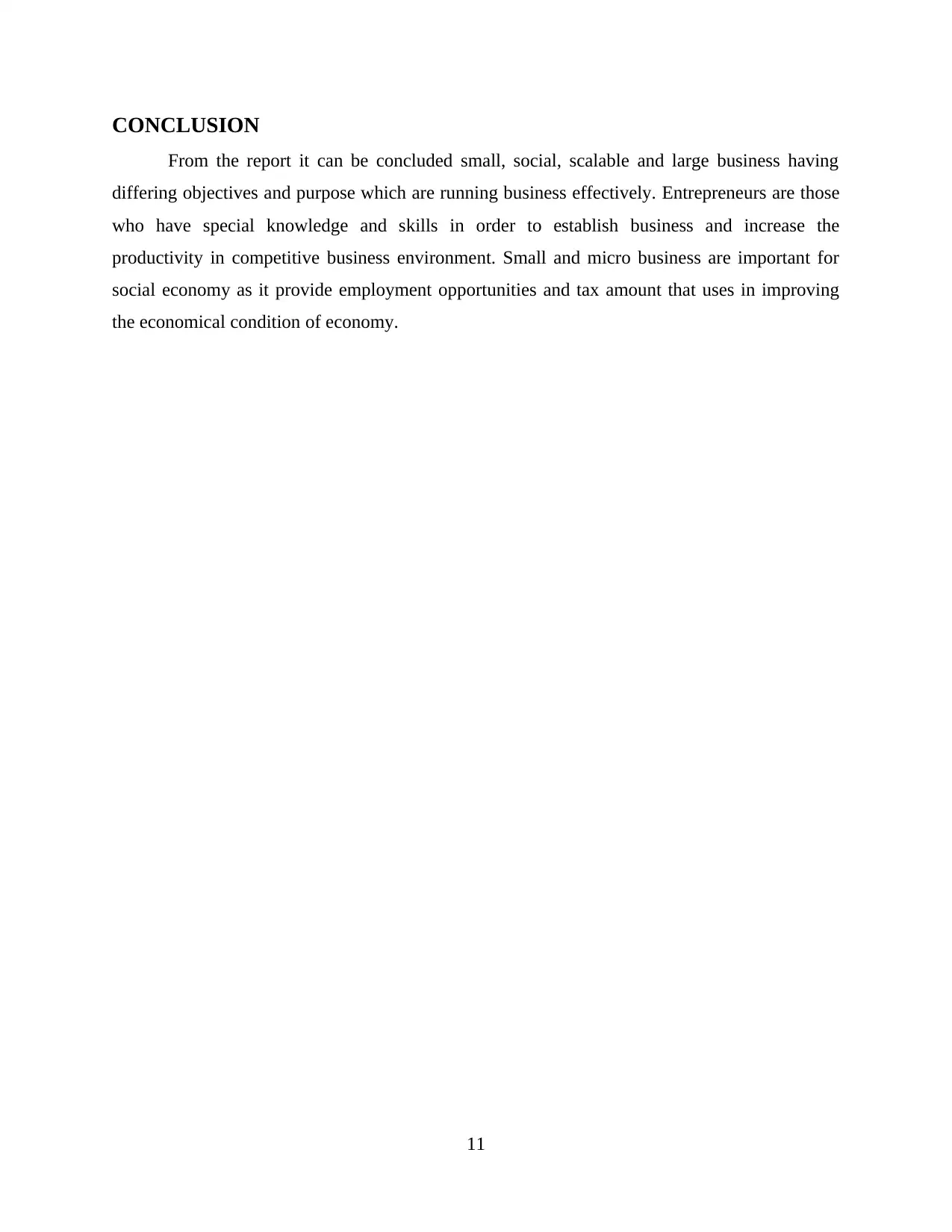
CONCLUSION
From the report it can be concluded small, social, scalable and large business having
differing objectives and purpose which are running business effectively. Entrepreneurs are those
who have special knowledge and skills in order to establish business and increase the
productivity in competitive business environment. Small and micro business are important for
social economy as it provide employment opportunities and tax amount that uses in improving
the economical condition of economy.
11
From the report it can be concluded small, social, scalable and large business having
differing objectives and purpose which are running business effectively. Entrepreneurs are those
who have special knowledge and skills in order to establish business and increase the
productivity in competitive business environment. Small and micro business are important for
social economy as it provide employment opportunities and tax amount that uses in improving
the economical condition of economy.
11
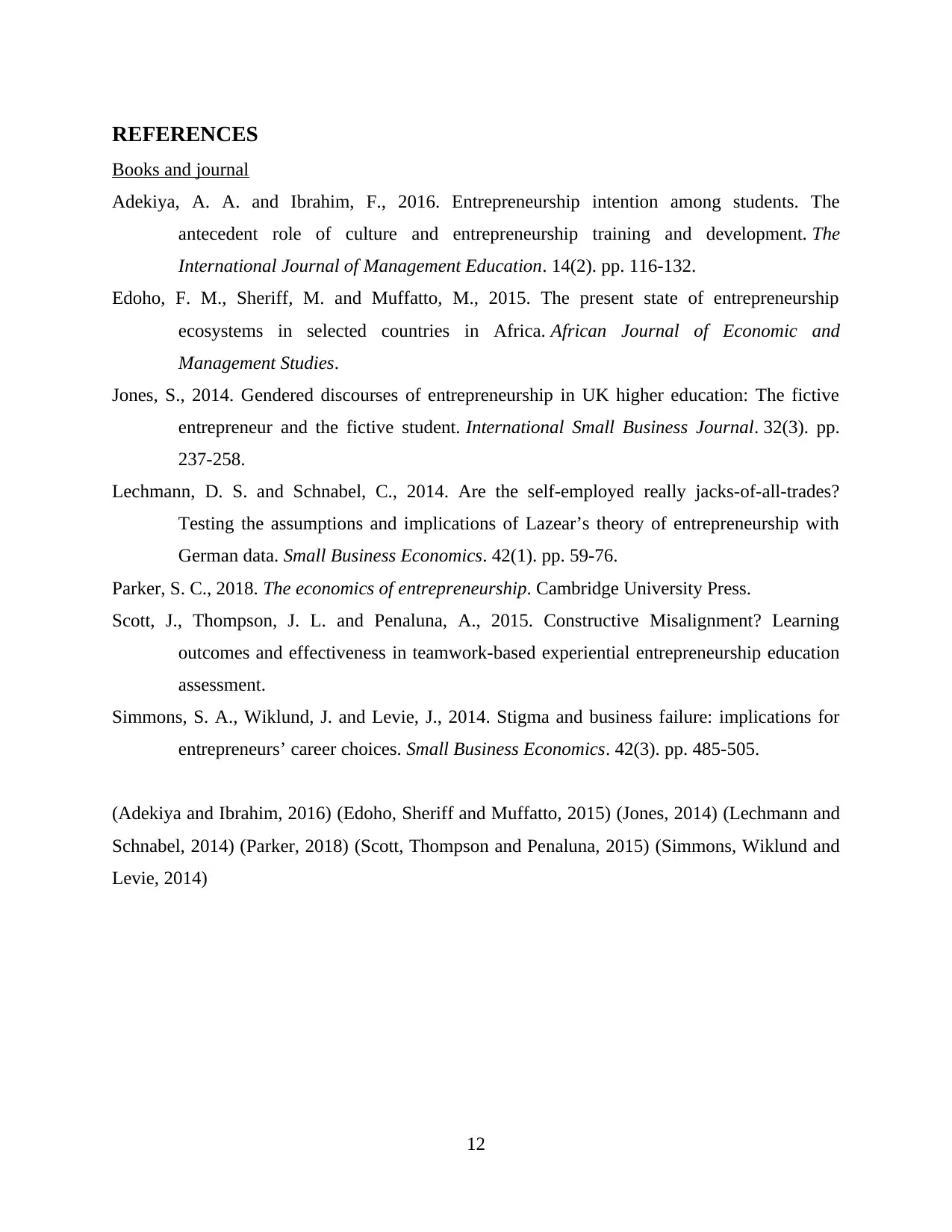
REFERENCES
Books and journal
Adekiya, A. A. and Ibrahim, F., 2016. Entrepreneurship intention among students. The
antecedent role of culture and entrepreneurship training and development. The
International Journal of Management Education. 14(2). pp. 116-132.
Edoho, F. M., Sheriff, M. and Muffatto, M., 2015. The present state of entrepreneurship
ecosystems in selected countries in Africa. African Journal of Economic and
Management Studies.
Jones, S., 2014. Gendered discourses of entrepreneurship in UK higher education: The fictive
entrepreneur and the fictive student. International Small Business Journal. 32(3). pp.
237-258.
Lechmann, D. S. and Schnabel, C., 2014. Are the self-employed really jacks-of-all-trades?
Testing the assumptions and implications of Lazear’s theory of entrepreneurship with
German data. Small Business Economics. 42(1). pp. 59-76.
Parker, S. C., 2018. The economics of entrepreneurship. Cambridge University Press.
Scott, J., Thompson, J. L. and Penaluna, A., 2015. Constructive Misalignment? Learning
outcomes and effectiveness in teamwork-based experiential entrepreneurship education
assessment.
Simmons, S. A., Wiklund, J. and Levie, J., 2014. Stigma and business failure: implications for
entrepreneurs’ career choices. Small Business Economics. 42(3). pp. 485-505.
(Adekiya and Ibrahim, 2016) (Edoho, Sheriff and Muffatto, 2015) (Jones, 2014) (Lechmann and
Schnabel, 2014) (Parker, 2018) (Scott, Thompson and Penaluna, 2015) (Simmons, Wiklund and
Levie, 2014)
12
Books and journal
Adekiya, A. A. and Ibrahim, F., 2016. Entrepreneurship intention among students. The
antecedent role of culture and entrepreneurship training and development. The
International Journal of Management Education. 14(2). pp. 116-132.
Edoho, F. M., Sheriff, M. and Muffatto, M., 2015. The present state of entrepreneurship
ecosystems in selected countries in Africa. African Journal of Economic and
Management Studies.
Jones, S., 2014. Gendered discourses of entrepreneurship in UK higher education: The fictive
entrepreneur and the fictive student. International Small Business Journal. 32(3). pp.
237-258.
Lechmann, D. S. and Schnabel, C., 2014. Are the self-employed really jacks-of-all-trades?
Testing the assumptions and implications of Lazear’s theory of entrepreneurship with
German data. Small Business Economics. 42(1). pp. 59-76.
Parker, S. C., 2018. The economics of entrepreneurship. Cambridge University Press.
Scott, J., Thompson, J. L. and Penaluna, A., 2015. Constructive Misalignment? Learning
outcomes and effectiveness in teamwork-based experiential entrepreneurship education
assessment.
Simmons, S. A., Wiklund, J. and Levie, J., 2014. Stigma and business failure: implications for
entrepreneurs’ career choices. Small Business Economics. 42(3). pp. 485-505.
(Adekiya and Ibrahim, 2016) (Edoho, Sheriff and Muffatto, 2015) (Jones, 2014) (Lechmann and
Schnabel, 2014) (Parker, 2018) (Scott, Thompson and Penaluna, 2015) (Simmons, Wiklund and
Levie, 2014)
12
⊘ This is a preview!⊘
Do you want full access?
Subscribe today to unlock all pages.

Trusted by 1+ million students worldwide
1 out of 14
Related Documents
Your All-in-One AI-Powered Toolkit for Academic Success.
+13062052269
info@desklib.com
Available 24*7 on WhatsApp / Email
![[object Object]](/_next/static/media/star-bottom.7253800d.svg)
Unlock your academic potential
Copyright © 2020–2026 A2Z Services. All Rights Reserved. Developed and managed by ZUCOL.




